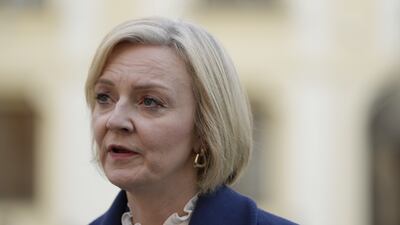Liz Truss will use a trip to Taiwan to call on her successor as British Prime Minister, Rishi Sunak, to call China a “threat” to UK security.
In a speech in the capital Taipei on Wednesday, Ms Truss is expected to challenge Mr Sunak to deliver on the language he used during last summer’s Conservative Party leadership contest.
During his unsuccessful campaign to become the next Conservative leader, he said China was “the biggest-long term threat to Britain”, while promising to close all 30 of Beijing’s Confucius Institutes in the UK.
The institutes promote Chinese culture on campus in higher education and in some British schools.
“Last summer the now British Prime Minister described China as ‘the biggest long-term threat to Britain’ and said the Confucius Institutes should be closed," she says in a pre-released extract of her speech to the Prospect Foundation.
“He was right and we need to see those policies enacted urgently.
“The UK’s integrated review needs to be amended to state clearly that China is a threat. Confucius Institutes should be closed down immediately.
"Instead the service could be provided by organisations with the support of Hong Kong nationals and Taiwanese nationals who have come to the UK on a free basis.”
During her brief time as prime minister, Ms Truss was widely expected to make the UK government more hawkish when it came to dealing with Beijing.
Liz Truss through the years - in pictures
But her stint in Downing Street, which was cut to only 44 days after her mini-budget's effects on the markets last year saw confidence in her premiership collapse, meant her update to the UK’s foreign policy did not happen.
Mr Sunak chose not to go that far, updating the UK’s integrated review on foreign and defence policy in March to describe China as representing an “epoch-defining and systemic challenge”.
In what is thought to be the first visit of a former British prime minister to Taiwan since Margaret Thatcher made the journey in the 1990s, Ms Truss is expected to urge the West not to work with China.
“There are still too many in the West who are trying to cling on to the idea that we can co-operate with China on issues like climate change, as if there is nothing wrong; that there are bigger issues than Chinese global dominance or the future of freedom and democracy,” she is expected to say.
“But without freedom and democracy there is nothing else.
“We know what happens to the environment or world health under totalitarian regimes that don’t tell the truth.”
Ms Truss is also expected to draw comparisons between the Chinese-Taiwanese tension and the Russian invasion of Ukraine.
China claims Taiwan as its territory and, while western countries say they back Taipei, none have officially recognised it as an independent state.
Beijing is said to be seeking reunification with the autonomous territory.
Truss unrepentant in final speech as UK prime minister - video
But it comes amid fears of a backlash from China against the UK, with Beijing reacting when Nancy Pelosi, then-speaker of the US House of Representatives, visited Taiwan last year.
China retaliated for the visit by staging a naval and air force blockade of Taiwan and cutting off channels of communication with Washington on issues from environmental protection to maritime security.
But Ms Truss will say western allies cannot avoid responding to Chinese aggression out of fear of a new Cold War.
“We in the United Kingdom and the free world must do all we can to back you,” she is expected to say.
A UK government spokesman said it was in Britain’s interests to “continue engagement” with China while recognising the challenges the Far East country presents.
“We have always been clear that China remains the biggest state-based threat to the UK’s economic security," the spokesman said.
“That’s why our integrated review refresh sets out a new approach to dealing with the challenge which China presents for the UK and the wider world.
“Given China is a permanent member of the UN Security Council and the second largest economy in the world, it’s in the national interest to continue engagement particularly on issues such as climate change, global health and macro-economic stability.
“This is an approach that has been reflected by many of our allies.”






































